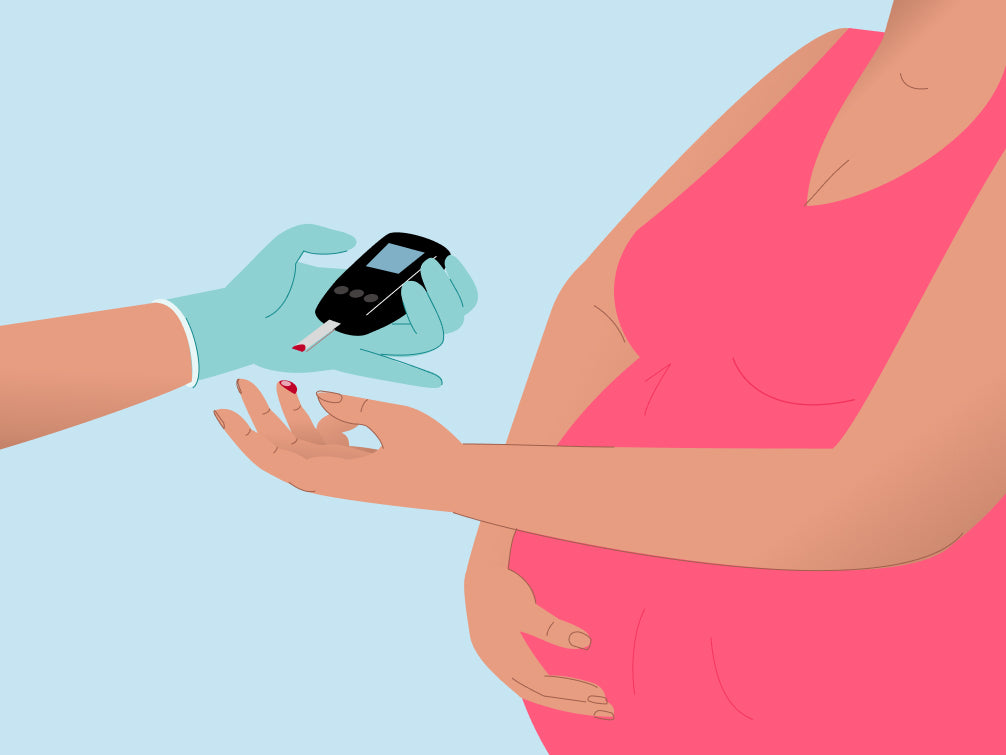Hiiii friend, marnie here, your pregnancy big sister helping you navigate all the ups, downs and pregnancy "scaries".
Health risks and concerns in pregnancy are certainly topics people have strong fears around, so the more we can educate ourselves on them, the better chance we have at reducing some of those fears, whether they concern ourselves or someone else that's close to us. Gestational diabetes is one increasingly common (possible) pregnancy health concern that is not talked about enough, and I want to. So let’s talk about it.
What is Gestational Diabetes?
Gestational diabetes is a condition that affects approximately 3-20% of pregnant women, causing high blood sugar levels during pregnancy. While it typically resolves after childbirth, it does require careful management during pregnancy to ensure the health of both the mother and her baby.
Note: I’m not a doctor, and this article will not provide you with professional medical advice. If you do have concerns about gestational diabetes, please talk to your doctor. The intent of this blog is for awareness and educational purposes.
So let’s dive into everything you should know about gestational diabetes, from causes and symptoms to management and potential risks.
How Does it Happen?
Gestational diabetes occurs when the body cannot produce enough insulin to meet the extra needs of pregnancy. Insulin is a hormone produced by the pancreas that helps regulate blood sugar levels. During pregnancy, the placenta produces hormones that can interfere with the action of insulin, leading to insulin resistance. This results in elevated blood sugar levels, which can pose risks to both the mother and her baby.
Several factors can increase the risk of developing gestational diabetes, including:
- Obesity or being overweight: Women who are overweight or obese before pregnancy are at a higher risk of developing gestational diabetes.
- Age: Women over the age of 25 are more likely to develop gestational diabetes.
- Family history: A family history of diabetes increases the risk of developing gestational diabetes.
- Previous gestational diabetes: Women who have had gestational diabetes in a previous pregnancy are more likely to develop it in subsequent pregnancies.
Symptoms
Gestational diabetes does not often cause noticeable symptoms, which is why screening is essential during pregnancy. However, some women may experience symptoms such as:
- Increased thirst
- Frequent urination
- Fatigue
- Blurred vision
- Nausea
Gestational diabetes is typically diagnosed between the 24th and 28th weeks of pregnancy. Screening involves a glucose challenge test, where the mother drinks a sugary solution, and her blood sugar levels are measured one hour later. If the results are higher than normal, a follow-up test called the glucose tolerance test may be performed to confirm the diagnosis.
Management and Treatment
Managing gestational diabetes involves maintaining blood sugar levels within a target range to reduce the risk of complications.
Treatment may include:
- Healthy eating: Following a balanced diet with controlled carbohydrate intake can help regulate blood sugar levels.
- Regular exercise: Engaging in moderate physical activity, such as walking or swimming, can help lower blood sugar levels.
- Monitoring blood sugar: Regularly monitoring blood sugar levels using a glucometer allows women to track their levels and make necessary adjustments to their diet and medication.
- Insulin therapy: If blood sugar levels remain elevated despite dietary and lifestyle changes, insulin injections may be necessary to control glucose levels.
Risks and Complications
If left uncontrolled, gestational diabetes can increase the risk of several complications for both the mother and her baby, including:
- Macrosomia: A condition where the baby grows larger than average, increasing the risk of complications during delivery.
- Preterm birth: Gestational diabetes can increase the risk of premature birth, which can lead to health problems for the baby.
- Hypoglycemia: After birth, the baby may experience low blood sugar levels due to the abrupt cessation of glucose from the mother.
- Type 2 diabetes: Women who have had gestational diabetes are at an increased risk of developing type 2 diabetes later in life.
Regular prenatal care and screening are essential for early detection and effective management of gestational diabetes. If you suspect you may be at risk for gestational diabetes or are experiencing symptoms, it is very important that you consult your healthcare provider for appropriate screening and guidance.
And please remember! With proper care and management, most women with gestational diabetes go on to have healthy pregnancies and babies.
Around here, you're never alone,
rumbly






